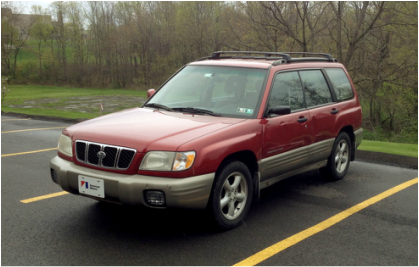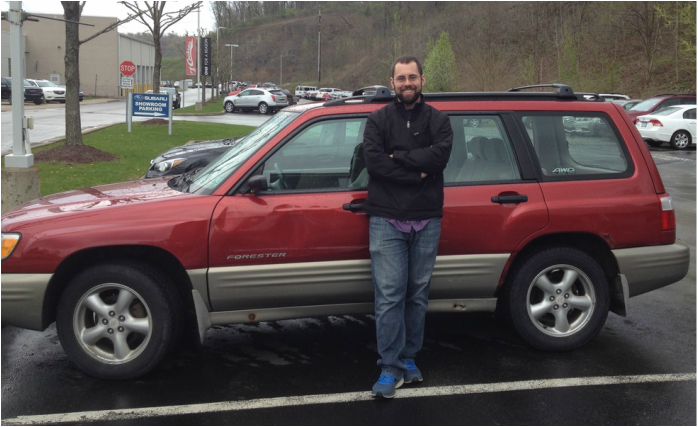
Anyone who thinks a car can't evoke emotion has clearly never watched any of Disney's Herbie movies. But even when automobiles aren't sentient, we still get very attached to them. Why is it that these rolling contraptions of steel, rubber, and glass have such a special place in our lives?
I knew my 2001 Subaru Forester would not last forever. When I purchased it a few years ago in Ohio, it already had 198,000 miles, and the rust belt winters certainly hadn't done it any favors. Even though Subarus are celebrated for their longevity, I could help feeling that this was a "transitional" car--something to help me get to the next stage of life where I could eventually afford a better car. With that in mind, I didn't plan on getting attached. The Forester wasn't my first car, and it wouldn't be the last.
This last year went hard on both of us. A pothole nearly the width of the whole road managed to break one of the rear struts on my way to work. Next, a juvenile delinquent threw rock into my taillight, which I had to fix with packaging tape and red Sharpie. Then, the alternator/power steering belt shredded itself, leaving me to coast into AutoZone and repair it in the parking lot. This winter we got scratched up from some accidental off-roading, hurting my pride more than anything else. While none of these incidents were fatal to the car, I couldn't ignore the signs of bigger troubles on the horizon. I noticed that passing trucks seemed to take more effort than before, there were scabs of rust on the quarter panels, an occasional "check engine" light eventually became persistent, and an oil stain began to form in the spot where I usually parked...
Yet, the car continued to serve me gallantly. Across bridges, through tunnels, up and down the hills of Pittsburgh we traveled together. Even during a brutal winter with multiple days below zero, the engine started on the first try every morning. On days where the heater couldn't overcome the cold, the heated seats made my commute bearable.
I think the struggle brought us together. There was a feeling that we were here for each other. The Forester took me wherever I needed to go, without relenting or complaining, and to return the favor, I always made sure it was gassed up and had enough oil. Like a pair of well worn shoes, the Forester's seats were comfortable to slide into after a long day at work. Neither one of us required any special treatment; we were content.
This spring, it became obvious that our time together was limited. The rust spots continued to grow, as did my concerns about passing the car passing its state inspection. On the highway, the car's lackluster performance felt less like an inconvenience and more like a legitimate danger. I finally decided I had to get a newer car. I found one with some shopping around, and the day finally came to trade in the Forester. On my way to and from work that day, my mind invariably filled with thoughts like, "This is the last time we'll drive to work together" and "this is the last time listen to this radio..." I even turned on the heated seats one last time. Saying goodbye turned out to be harder than I thought it would be.
Why is it that we become so attached to our automobiles? Essentially, a car is just an appliance--something we use every day to make our lives easier. Yet, nobody writes songs about their refrigerator, or reminisces about how much they loved their first water heater. Cars somehow have a way of connecting with us on a much deeper level. Perhaps those Herbie movies aren't so much a fantasy as they are a commentary on our relationships with automobiles.
What new car I bought really doesn't matter. To mention it here would distract from the Forester's story. In time, I'm sure it will come to mean something different yet equally important to me. I hope the Forester's new owner can appreciate all the things I came to love about it, and if this year's winter is anything like the last, that person is going to really appreciate the heated seats.
To the Forester, thanks for being an unexpected friend. You were one of the best used cars a guy could ask for.
I knew my 2001 Subaru Forester would not last forever. When I purchased it a few years ago in Ohio, it already had 198,000 miles, and the rust belt winters certainly hadn't done it any favors. Even though Subarus are celebrated for their longevity, I could help feeling that this was a "transitional" car--something to help me get to the next stage of life where I could eventually afford a better car. With that in mind, I didn't plan on getting attached. The Forester wasn't my first car, and it wouldn't be the last.
This last year went hard on both of us. A pothole nearly the width of the whole road managed to break one of the rear struts on my way to work. Next, a juvenile delinquent threw rock into my taillight, which I had to fix with packaging tape and red Sharpie. Then, the alternator/power steering belt shredded itself, leaving me to coast into AutoZone and repair it in the parking lot. This winter we got scratched up from some accidental off-roading, hurting my pride more than anything else. While none of these incidents were fatal to the car, I couldn't ignore the signs of bigger troubles on the horizon. I noticed that passing trucks seemed to take more effort than before, there were scabs of rust on the quarter panels, an occasional "check engine" light eventually became persistent, and an oil stain began to form in the spot where I usually parked...
Yet, the car continued to serve me gallantly. Across bridges, through tunnels, up and down the hills of Pittsburgh we traveled together. Even during a brutal winter with multiple days below zero, the engine started on the first try every morning. On days where the heater couldn't overcome the cold, the heated seats made my commute bearable.
I think the struggle brought us together. There was a feeling that we were here for each other. The Forester took me wherever I needed to go, without relenting or complaining, and to return the favor, I always made sure it was gassed up and had enough oil. Like a pair of well worn shoes, the Forester's seats were comfortable to slide into after a long day at work. Neither one of us required any special treatment; we were content.
This spring, it became obvious that our time together was limited. The rust spots continued to grow, as did my concerns about passing the car passing its state inspection. On the highway, the car's lackluster performance felt less like an inconvenience and more like a legitimate danger. I finally decided I had to get a newer car. I found one with some shopping around, and the day finally came to trade in the Forester. On my way to and from work that day, my mind invariably filled with thoughts like, "This is the last time we'll drive to work together" and "this is the last time listen to this radio..." I even turned on the heated seats one last time. Saying goodbye turned out to be harder than I thought it would be.
Why is it that we become so attached to our automobiles? Essentially, a car is just an appliance--something we use every day to make our lives easier. Yet, nobody writes songs about their refrigerator, or reminisces about how much they loved their first water heater. Cars somehow have a way of connecting with us on a much deeper level. Perhaps those Herbie movies aren't so much a fantasy as they are a commentary on our relationships with automobiles.
What new car I bought really doesn't matter. To mention it here would distract from the Forester's story. In time, I'm sure it will come to mean something different yet equally important to me. I hope the Forester's new owner can appreciate all the things I came to love about it, and if this year's winter is anything like the last, that person is going to really appreciate the heated seats.
To the Forester, thanks for being an unexpected friend. You were one of the best used cars a guy could ask for.


 RSS Feed
RSS Feed
